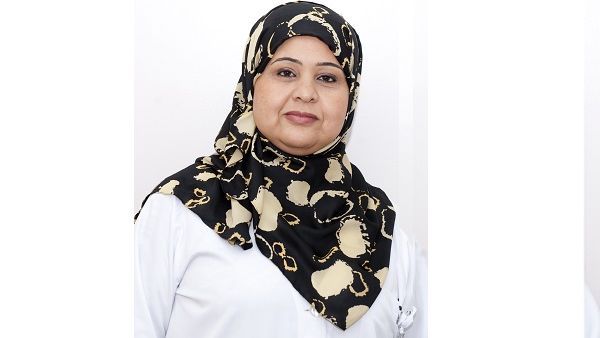Simple dietary and lifestyle changes can help pregnant women avoid gestational diabetes

Taking charge of her health through simple diet and lifestyle changes helped one Hamad Medical Corporation (HMC) patient prevent gestational diabetes mellitus (GDM). Mrs. Lara Ojetola, a patient receiving pre-natal care at Women’s Hospital (WH), was able to successfully prevent the development of GDM through reducing her blood sugar levels.
“When I did the glucose tolerance test at around 27 weeks into my pregnancy, it was discovered that one of the three readings was high. This meant I could be developing GDM. So I was referred to the WH Dietetic Clinic for guidance and counselling where a dietitian gave me an orientation about how to change my diet to lower carbohydrate and lower fat,” said Mrs. Ojetola.
GDM is one of the most common health problems for pregnant women. It affects about 5 percent of all pregnancies and if left untreated can cause health problems for both mother and baby. According to the American Diabetes Association (ADA), if well controlled, the condition resolves after pregnancy in about 90 percent of women.
As part of its efforts to support patients, WH’s diabetes prevention and education program offers multidisciplinary instruction in diabetes management. The program is staffed by physicians, nurses, diabetes educators and registered dietitians who work together to offer a specialized diabetes education program to teach self-management techniques to mothers-to-be.
Mrs. Ojetola said the dietitian advised her to perform home glucose monitoring, which she was instructed to do six times daily for two weeks. This would allow her to monitor her condition and would determine if she required a referral to the Diabetes Clinic at the Hospital’s Feto-Maternal Unit where medications could be prescribed, if required.
“I was at first disturbed at the news of the glucose test result fearing having diabetes could hurt my baby. But since controlling my diet by cutting down on the amount of carbohydrate and sugar-rich fruits I consume daily, my blood sugar readings have been within the normal range. I have successfully prevented GDM by taking charge of my diet through strict adherence to the meal plan I was offered at the Dietetic Clinic and I do not have the need to take any oral medication,” stated Mrs. Ojetola.
However, she added that she still continues to self-monitor and record her blood glucose four times daily and continues to discuss the readings with her gynecologist at every hospital visit.
Simple dietary and lifestyle changes can prevent GDM and its complications in pregnant women, confirmed Dr. Buthaina Ibrahim Alowinati, Senior Consultant in Medicine at the National Diabetes Center. According to the International Diabetes Federation, approximately 33 percent of pregnant women in Qatar have this condition.
“It is essential for women to take care of themselves by living a healthy lifestyle. As mothers, women will be the healthcare champions and role models for their families,” stressed Dr. Alowinati explaining further that, “If GDM is caught early, we can manage the treatment of our patients more effectively by putting them on a special diet. After ensuring that changes are made to their diet, if their blood sugar is still not controlled they will be prescribed oral medication and then if this is not effective they will be administered insulin to manage their diabetic condition.”
The World Health Organization (WHO) states that GDM is a serious condition, resulting in birthing complications, an increase in Cesarean section births, large babies and a higher risk of obesity for the baby in later years.
While encouraging women to get tested for GDM early in their pregnancy to prevent diabetes complications, Dr Alowinati said, “Women may be at particular risk of having gestational diabetes if they are overweight and have a body mass index of 25 kg/m2 or greater. Women who are sedentary and have a family history of Type 2 diabetes, or have high blood pressure and smoke are at an increased risk. In addition, those who suffer from high cholesterol or have a history of polycystic ovarian syndrome or have had a baby weighing 4 kilograms or more are also at an increased risk.”
WH offers daily nutritional counselling without an appointment (walk-in clinic) and a weekly group education clinic in English, Arabic and Hindi, every Monday from 11 am - 12 pm, for the purpose of educating women on living well with diabetes, and offering preventative counseling to help women avoid the chronic disease.
Women with Type 1 or Type 2 diabetes are referred to a diabetes educator at WH for instruction on how to take insulin injection, treating low and high blood sugar, how to use a glucometer, chart their blood sugar levels and follow home glucose monitoring.
All patients have access to a diabetic hotline: 4439-6980 to access diabetic counselling, five days a week (Sunday to Thursday) at 8 am – 2 pm.
Background Information
Hamad Medical Corporation
Hamad Medical Corporation (HMC) is the main provider of secondary and tertiary healthcare in Qatar and one of the leading hospital providers in the Middle East.
For more than four decades, HMC has been dedicated to delivering the safest, most effective and compassionate care to all its patients.






